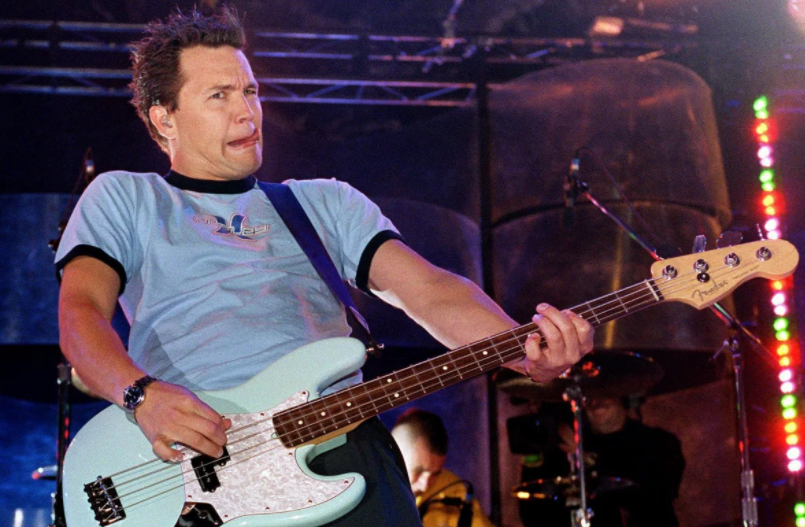No products in the cart.
New
Is Mark Hoppus Vegan? Exploring the Dietary Journey of the Blink-182 Bassist
When the question arises about the dietary habits of a renowned artist like Mark Hoppus, the bassist of the popular band Blink-182, we are not merely seeking a simple yes or no answer. Behind this inquiry lies a complex journey intertwined with matters of health, social consciousness, and personal transformation.
The Path to Veganism

Initially, Hoppus embraced a vegan lifestyle and was a passionate advocate for animal rights. According to various sources, he encouraged his fans to treat animals as cherished companions rather than mere food resources, showcasing his profound understanding and empathy for the well-being of animals.
Hoppus’ Vegan Convictions

- Hoppus was a vocal supporter of animal rights and promoted the idea of viewing animals as friends, not just food sources.
- His initial adoption of a vegan diet was driven by his strong ethical beliefs and desire to minimize harm to sentient beings.
- The bassist’s commitment to veganism reflected his dedication to making a positive impact on the world and living in alignment with his principles.
Navigating Health Challenges
However, life’s journey is rarely a straight path, and Hoppus faced a significant health challenge that prompted a shift in his dietary choices. After being diagnosed with cancer, his medical team advised him to incorporate meat into his diet to aid his recovery and restore his health.
Balancing Health and Ethics
This decision presented a difficult dilemma for Hoppus, who had to reconcile his ethical values with the practical realities of his health needs. The tension between his personal ideals and the pressing demands of his physical well-being forced him to make a challenging choice, one that many find themselves grappling with in similar circumstances.
The Impact of Hoppus’ Dietary Transition

Hoppus’ transition away from a strictly vegan diet has sparked interesting discussions surrounding the intersection of individual values, social influence, and the complexities of living in a multifaceted world.
Societal Perceptions and Expectations
When a public figure like Hoppus, who had previously been a vocal advocate for animal rights, moves away from a vegan lifestyle, it can elicit strong reactions from the public. Some may view this as a betrayal of his principles, questioning the authenticity of his previous commitment to the cause.
Navigating Personal and Public Spheres
However, it is essential to recognize that individual choices, especially those involving personal health, are often nuanced and deeply personal. The decision to modify one’s dietary habits in the face of a health crisis does not necessarily equate to a complete abandonment of one’s values or a loss of integrity.
Balancing Ideals and Practical Realities
Hoppus’ experience highlights the challenges we all face in navigating the delicate balance between our personal ideals and the practical realities of our lives. It serves as a reminder that even those who champion noble causes may sometimes be compelled to make difficult choices that prioritize their well-being, without necessarily compromising the core of their beliefs.
The Societal and Cultural Implications
Hoppus’ dietary transition also opens up intriguing discussions about the broader societal and cultural implications of such choices, particularly when it involves a public figure.
The Influence of Celebrities
When a celebrity like Hoppus alters their dietary habits, it can have a ripple effect on their fanbase and the public at large. This shift in perspective can either inspire others to reconsider their own dietary choices or, conversely, dampen the enthusiasm for plant-based lifestyles among those who view Hoppus’ decision as a betrayal of his former convictions.
Redefining Societal Norms
Hoppus’ journey also highlights the evolving nature of societal attitudes and norms surrounding dietary choices. As more individuals grapple with the complexities of balancing personal health, environmental concerns, and ethical considerations, the narrative around veganism and plant-based diets continues to evolve, challenging the rigid categorizations that often accompany such lifestyle choices.
The Dynamics of Dietary Decisions
Hoppus’ experience serves as a powerful reminder that dietary decisions are often deeply personal and can be influenced by a multitude of factors, from health considerations to cultural and social pressures. By acknowledging the nuances and complexities inherent in such choices, we can cultivate a more empathetic and understanding discourse around the diverse paths individuals may take in their quest for personal and collective well-being.
The question “Is Mark Hoppus vegan?” cannot be answered with a simple yes or no, as it reflects a complex personal journey filled with challenges, ethical dilemmas, and the need to make difficult decisions. Hoppus’ transition away from a strictly vegan diet, driven by health concerns, highlights the delicate balance between individual values, social influence, and the practical realities of everyday life.
By exploring Hoppus’ story, we gain a deeper understanding of the multifaceted nature of dietary choices and the profound impact they can have on both the individual and the broader societal landscape. This narrative invites us to approach such matters with empathy, nuance, and a willingness to engage in thoughtful discourse, recognizing that the path to personal and collective well-being is often paved with complex decisions and a continuous process of reevaluation and adaptation.
